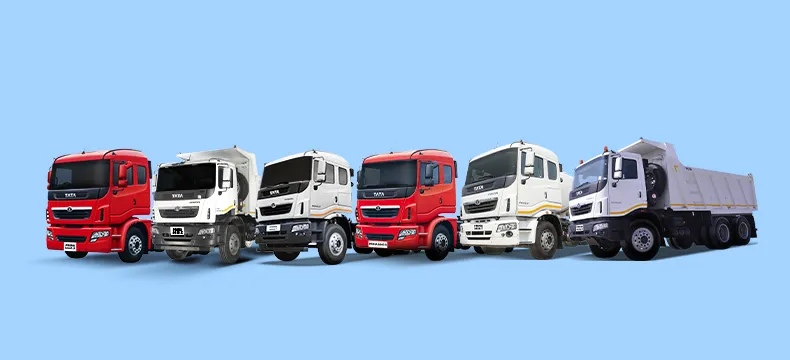12 Dec 2025

What Exactly is Torque in a Truck Engine?
- Tata Motors
- 16 May 2025
- COMMERCIAL VEHICLE
Introduction
When considering a truck's performance, one of the most crucial terms you'll come across is torque. Why is it important, and how does it affect truck performance? These are important questions to ask when making the right pick while evaluating truck models. Simply put, torque is responsible for the ability of trucks to haul heavy loads while driving on challenging terrains. Read ahead to understand what torque is in an engine to make better decisions when selecting a truck.
What is Torque in a Truck Engine?
Torque in a commercial vehicle is known as the rotational or the twisting force produced by a truck's engine. It is responsible for turning the truck's wheels. Torque maintains constant rotation when the engine's pistons move up and down the crankshaft. The power generated through this action is shifted to the truck's wheels. It is measured in Newton-meters (Nm) or pound-feet (lb-ft). The torque in a truck engine essentially determines the pulling power of a vehicle.
How is Torque Calculated?
Torque is calculated using a simple formula:
Torque (Nm) = Force (N) x Lever arm (m)
Torque in the truck engine is typically measured at the crankshaft before being distributed through the drivetrain. The calculation involves aspects like:
-
Engine Displacement
Larger engines typically generate more torque.
-
Revolutions Per Minute (RPM)
Torque output varies at different RPM ranges.
-
Gearing System
Trucks use gear ratios to maximise torque power for different driving conditions.
Effect of Torque on Truck Performance
Torque has a significant impact on how well a truck performs under different conditions. It mainly affects components like:
-
Towing Capacity
Trucks with high torque can pull trailers and heavy cargo without straining the engine. This is helpful in logistics and construction applications.
-
Acceleration
More torque allows a truck to gain speed quickly, even when carrying a load. This is particularly useful for highway merging and overall driving efficiency.
-
Fuel Efficiency
A truck with optimised torque can operate efficiently while reducing fuel consumption in demanding conditions.
-
Climbing Power
Trucks operating in hilly areas or rough terrains can maintain stability and steady movement with high torque.
-
Off-Road Performance
Vehicles designed for off-roading rely on high torque to navigate steep inclines or uneven surfaces efficiently. Torque helps them maintain consistent wheel movement and prevents loss of traction.
Importance of Torque in Engine
Torque is an important aspect of a truck's performance. It plays a fundamental role in:
-
Heavy-Duty Applications
Transport trucks, construction vehicles, and other trucks with heavy applications require high torque to move heavy goods without excessive strain on the engine.
-
Longevity of Engine
An engine with sufficient torque tends to operate more efficiently and faces less wear and tear over time. A well-balanced torque prevents excessive overheating and strain on the engine.
-
Smooth Driving Experience
Trucks with good torque distribution offer better control and handling. They are especially adept at managing stop-and-go traffic or challenging terrains.
-
Load Distribution
With sufficient torque, the power is evenly distributed across the drivetrain. This leads to an overall better performance.
-
Lowering Maintenance Costs
As torque directly impacts engine stress, maintaining an optimised torque output helps reduce wear, leading to fewer breakdowns and lower maintenance costs.
Conclusion
As you now know what torque is, you can make an informed decision while selecting a truck for your fleet. With this force that drives your truck forward, helps carry heavy loads, and maintains stability and operating efficiency, you get game-changing performance. Hence, it is an essential factor you want to consider if you plan to invest in a reliable vehicle. Be it logistics, construction, or off-roading, understanding torque is crucial while buying a heavy-duty truck.
FAQs
What is the ideal torque for a truck?
The ideal torque for a truck depends on its size and purpose. For light-duty trucks, it can range between 270 to 540 Nm. Heavy-duty trucks, on the other hand, may have a torque over 1,350 Nm. Higher torque allows these trucks to better tow and haul larger loads.
How does torque differ from horsepower?
Torque is the force that helps a vehicle move. It is especially crucial for climbing hills or other steep inclines. It is measured in Newton meters (Nm). Conversely, Horsepower is a combination of torque and engine speed (RPM). It is the maximum power the vehicle possesses. It is the rate at which the truck's engine accomplishes work. While torque helps with towing, horsepower determines the top speed and acceleration.
Is high torque always better for a truck?
Not necessarily. Whether a truck needs high torque depends on its purpose. Heavy-duty trucks need high torque, while smaller utility trucks may perform well with moderate torque and can benefit from high horsepower for last-mile deliveries.
- Tags





















